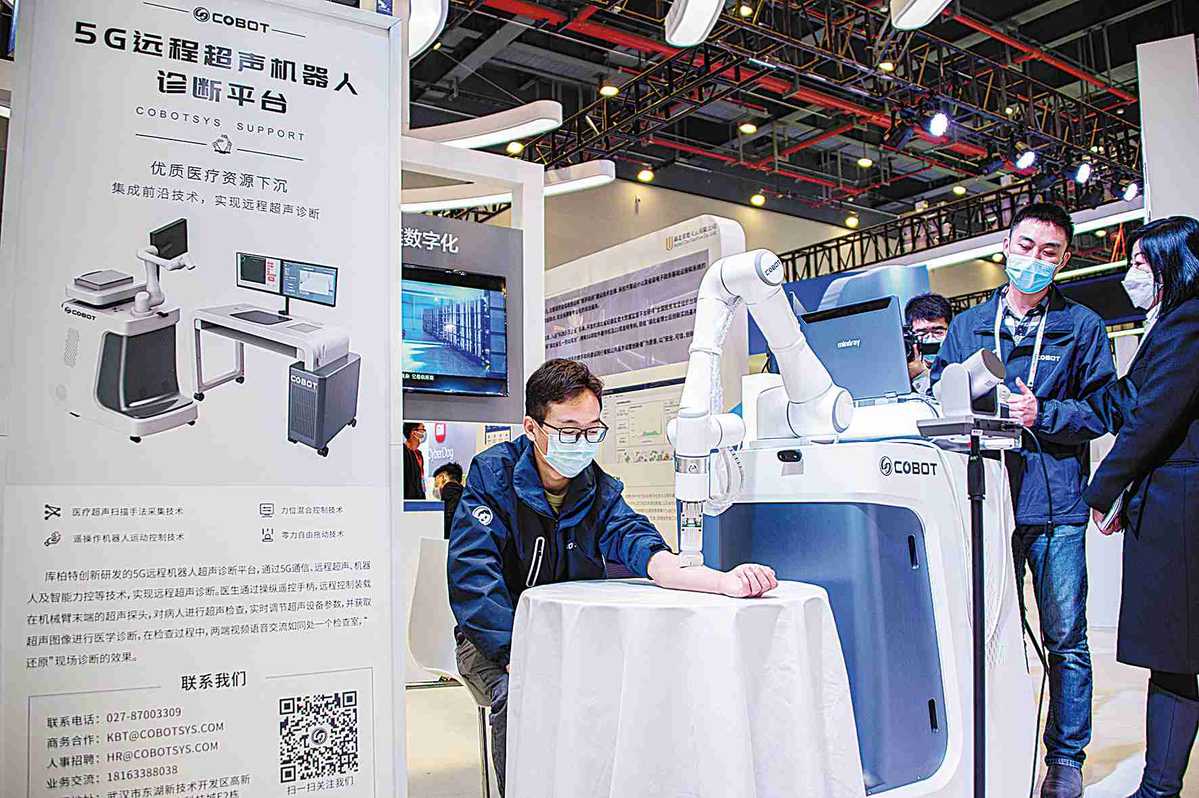5G, industrial internet helping transform heavy industries
By MA SI | China Daily | Updated: 2022-05-25 10:21

He said the market size of the industrial internet has crossed the milestone of 1 trillion yuan ($157 billion) in China.
Zhao Houlin, secretary-general of the International Telecommunication Union, said earlier that China has built the largest commercial 5G network, and the nation's consumer internet and industrial internet have also entered the fast lane, putting China among the leaders in global innovation and development.
To better pounce on opportunities, last month, the MIIT unveiled a 2022 work plan for the industrial internet, which called for efforts to build 10 factories fully covered by 5G, and cultivate about 10 industrial internet public service platforms in specific regions this year.
Moreover, efforts will be made to construct regional subcenters of national industrial internet big data centers in Chongqing as well as in the provinces of Shandong, Zhejiang, Liaoning, Jiangsu and Guangdong, the plan said.
Data from the MIIT showed that the country has nurtured over 100 industrial internet platforms that have strong regional and industry influence, with 76 million units of industrial equipment connected to the platforms, which have served 1.6 million industrial enterprises from a wide range of sectors.
Hydropower stations are another example of how the 5G+ industrial internet is shaping traditional sectors. Tingzikou hydropower station in Guangyuan, Sichuan province, has deployed 5G networks from China Mobile with a private industrial internet built for the station.
With the help of 5G networks, an underwater robot can be used to automatically inspect the hydropower station's water volume to ensure safety and efficiency.
Wang Haoran, an expert from Tsinghua University's Sichuan Energy Internet Research Institute, said every three to five years, or following every major flood, Tingzikou station's basin undergoes a thorough check.
In the pre-robotics era, workers would undertake deep dives to conduct such checks, which were relatively inefficient, time-consuming and tended to interrupt power supply. "Such a process could consume three to six months and cost around 5 million yuan," Wang said.
But 5G robots can accomplish the task in about 20 days as they obviate the need to pump out water from the basin and can do some basic work like removing silt. "The cost of each check can be lowered to 700,000 yuan," said Wang.
5G-powered aerial drones are also used in dam checks. By integrating AI, big data and other cutting-edge technologies, China Mobile has built a high-precision dam surface inspection system that uses autonomous 5G drones, which can map in 3D.
These real-case applications of 5G and the industrial internet showcase the strides China has made in using these technologies. They are partly the result of the central government's push to strengthen local companies' competence in the sector, a frontier where countries around the world are scrambling to establish a beachhead.
Alex Sinclair, chief technology officer for the GSMA, an industry alliance, said: "China is betting big on the industrial internet of things to increase productivity and drive efficiency by streamlining and automating manufacturing processes via internet connectivity. Backed by positive government support, China is set to become the world's leader (in this field)."
According to the alliance, by 2025, there will be 13.8 billion industrial IoT connections worldwide, with China accounting for some 4.1 billion, or one-third of the global market.
Zhang Yong, CEO of Alibaba Group, said earlier that the industrial internet's future lies in its deep integration with the consumer internet, which will help build a vibrant market-oriented and market-driven economy.
A case in point is Alibaba Xunxi (Hangzhou) Digital Technology Co Ltd, a unit of Alibaba Group Holding Ltd, that focuses on smart manufacturing. Xunxi is using the company's cloud computing infrastructure and IoT technologies to enable agile manufacturing and on-demand production.
An Xiaopeng, chief strategy officer of Alibaba Xunxi (Hangzhou) Digital Technology Co Ltd, said clothing orders have become increasingly smaller, dropping from tens of thousands of pieces in the past to around 3,000 pieces per order now. And some online orders are now as small as 100 pieces of clothing per order. But manufacturing could not keep up with the change, which leads to heavy inventories.
To solve the problem, Xunxi helps digitalize the entire clothing industrial chain from procurement and manufacturing all the way to retail to enable on-demand and small-batch production. Xunxi also connects retailers on Alibaba's Tmall e-commerce platform directly with clothing plants to help quickly respond to consumers' changing needs, deliver orders promptly and maintain low inventories.
"Xunxi combines the advantages of the consumer internet and industrial internet. It showcases China's technological prowess in consumer-oriented internet and the nation's unique position as a manufacturing powerhouse," An added.
























